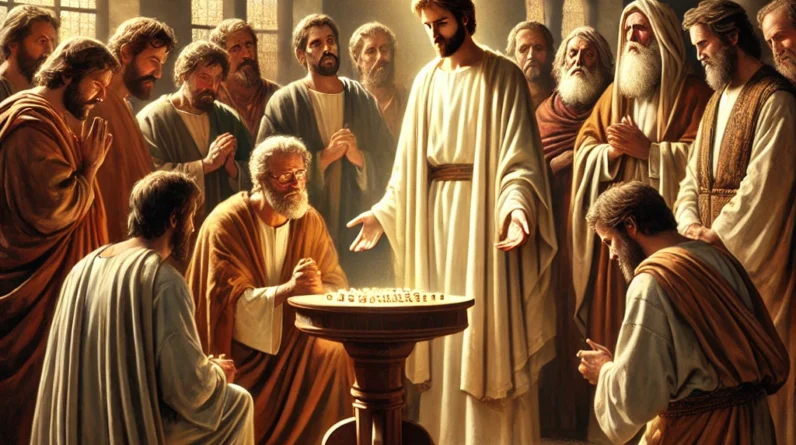Explore Matthew’s extraordinary transformation from a tax collector to a devoted disciple in this insightful post. Discover his inspiring journey in the New Testament.
Matthew: From Tax Collector to Devoted Disciple
Have you ever wondered how an ordinary tax collector could become one of the most devoted followers of Jesus? Meet Matthew—a pivotal figure in the New Testament whose journey is as transformative as it is inspiring. Known for his role in Jesus’ ministry and authorship of one of the four canonical Gospels, Matthew offers a narrative rich in lessons and insights for believers today. This article will delve into his background, his calling to discipleship, notable events in his life, and the enduring impact of his contributions.
Who Was Matthew?
Full Name and Meaning
Matthew, also known as Levi, carries a name with profound significance. The name “Matthew” comes from the Hebrew name “Matityahu,” meaning “Gift of Yahweh.” His alternate name, Levi, suggests he might have been from the tribe of Levi, traditionally the priestly class within Israel. This dual naming isn’t unusual among the apostles, as many had names that linked them either culturally or religiously to their heritage.
Background
Before following Christ, Matthew’s occupation was one of notoriety—he was a tax collector, a profession often despised by his fellow Jews. Tax collectors were seen as collaborators with the Roman occupiers, often associated with corruption and extortion. Operating in Capernaum, a significant town on the Sea of Galilee, Matthew occupied a lucrative yet reviled position within society. His work likely allowed him greater wealth and influence than the average fisherman or laborer, yet it also isolated him from his people.
First Mention in the Bible
Matthew’s entry into the biblical narrative is compelling. He first appears in the Gospel that bears his name, where his calling is recorded in a straightforward yet transformative moment. The Gospel of Matthew highlights this moment with simplicity and power, marking the first mention of this pivotal apostle.
📖 Bible Reference: Matthew 9:9
Calling to Discipleship
How They Met Jesus
Matthew’s encounter with Jesus is a lesson in the unexpected. While sitting at his tax booth, Jesus approached him, uttering the transformative invitation, “Follow me.” This simple command carried a wealth of meaning. Jesus, a rabbi, and teacher, chose to extend this invitation to someone considered unclean and unworthy by religious standards.
Immediate Response
Remarkably, Matthew’s response to Jesus’ call was immediate. He left his post, abandoning a life of financial security for the uncertainty of discipleship. This readiness to follow speaks volumes about his character and the magnetic draw of Jesus’ presence and message.
Role Among the Twelve
While Matthew was not part of Jesus’ inner circle, which included Peter, James, and John, his role among the Twelve was no less significant. His unique perspective, influenced by his former life, contributed to a diverse group of apostles, each bringing their strengths and challenges to Jesus’ mission.
📖 Bible Reference: Mark 2:14
Notable Events and Actions
Key Moments
Matthew’s transformation from tax collector to disciple is marked by key moments that highlight his evolving journey. One such event was the dinner at his house, where he invited Jesus and other tax collectors and sinners. This gathering drew criticism from the Pharisees, who questioned why Jesus would associate with such people. Jesus’ response, stating that he came not to call the righteous but sinners, underscored Matthew’s transformative journey.
Strengths & Weaknesses
Matthew’s strengths lay in his meticulous nature, likely developed from his background in record-keeping and accounting. His Gospel reflects this attention to detail, offering a comprehensive account of Jesus’ teachings and activities. However, like all humans, Matthew also had his struggles. The isolation and possible guilt from his past life as a tax collector may have been burdens he carried—illustrating the universal challenge of reconciling with one’s past.
📖 Bible Reference: Matthew 9:10-13

Their Role in the Early Church
What Happened After Jesus’ Resurrection?
Following Jesus’ resurrection, Matthew was among the apostles who embraced the charge to spread the Gospel to distant lands. According to early church tradition, Matthew preached to Jewish communities, bringing the message of the Messiah to dispersed Israelites.
Key Contributions
One of Matthew’s enduring contributions to Christianity is the Gospel according to Matthew. This text is particularly distinctive for its emphasis on Jesus as the fulfillment of Old Testament prophecies, connecting Jewish heritage with the new covenant established through Christ.
Their Missionary Work
Traditions hold varied accounts of Matthew’s missionary activities. Some suggest he traveled to regions as varied as Ethiopia, Persia, and Macedonia, spreading Christianity to both Jews and Gentiles alike.
📖 Bible Reference: Acts 1:13-14
How Did Matthew Die?
Martyrdom or Natural Death
Details regarding Matthew’s death are primarily derived from church tradition rather than explicit biblical accounts. Some traditions assert that he was martyred in Ethiopia, while others suggest he died of natural causes. Regardless of the manner of his death, Matthew’s commitment to his faith even unto death left an indelible mark on Christian history.
Significance of Their Death
Matthew’s story—from an ostracized tax collector to a devoted martyr—symbolizes the transformative power of Jesus’ message. His willingness to abandon everything for Jesus and his eventual martyrdom underscores a life spent in the service of eternal truths, inspiring countless believers over the centuries.
Lessons We Can Learn from Matthew
Key Takeaways
Matthew’s life reminds us of the potential for radical change. No matter how far one might feel from righteousness, the call of Jesus offers a path of redemption and purpose. Matthew’s attention to detail and careful documentation of Jesus’ teachings highlight the importance of preserving and sharing the message of hope and transformation.
Personal Application
In today’s world, where many wrestle with identity and purpose, Matthew’s story encourages openness to divine invitations for change. As Christians, we can learn from Matthew’s example to be willing to leave behind our past entanglements, dedicating ourselves to the transformative journey that following Jesus invites us on.
📖 Bible Reference: 2 Corinthians 5:17
Conclusion
Matthew’s journey from tax collector to devoted disciple illustrates the transformative power of Jesus’ call. His contributions, both in his lifetime and through the Gospel he left behind, continue to reverberate through Christian thought and tradition. As we consider Matthew’s life, we are invited to reflect on our willingness to answer the call to follow Jesus with the same dedication and courage. How can you incorporate Matthew’s readiness and devotion into your spiritual journey?
Acknowledgment: All Bible verses referenced in this article were accessed via Bible Gateway (or Bible Hub).







